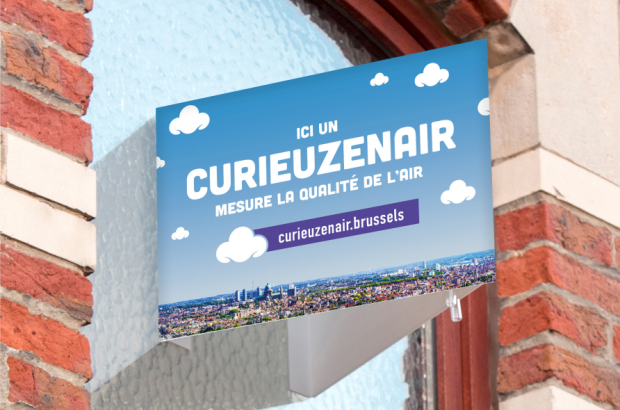- Daily & Weekly newsletters
- Buy & download The Bulletin
- Comment on our articles
Air quality study shows poorer neighbourhoods suffer the most
The experts have had their say on the CurieuzenAir study on air quality in the Brussels region, with most saying that the city is "on the right track, but we're not there yet." Now it is the turn of the politicians to suggest what action needs to be taken.
The map of the CurieuzenAir study, which shows the concentration of the harmful gas nitrogen dioxide in Brussels, corresponds well with the historical layout of the city. Neighbourhoods with a large traffic density do poorly, while in the spacious and green suburbs it is healthier to breathe.
This map highlights the link between bad air and poverty. It is in the poorer neighbourhoods that nitrogen dioxide emissions are soaring. "That can only mean that we have to strengthen our fight against bad air there," says minister of mobility Elke Van den Brandt. "Especially when you know that car ownership in those districts is the lowest in the whole of Brussels."
The fact that built-up areas where nitrogen dioxide is at its highest, despite car ownership being at its lowest, suggests that these neighbourhoods suffer from passing traffic polluting the surroundings. These are usually neighbourhoods where cars cut through to avoid traffic jams on the main arteries, bringing their fumes to densely populated urban areas.
While some neighbourhoods in Brussels are already working to address this problem with re-routing street plans and car bans, not all the areas that show up with red and purple on the CurieuzenAir map have initiatives in place.
To help reduce the pollution in poorer areas, minister Van den Brandt is planning a three-pronged approach: to accelerate the modal shift, by focusing on alternatives to the car, such as STIB public transport or the bicycle; by rolling out the low-emission zone further; and by using the Good Move plan to make the 50 Brussels districts car-free. "Less traffic in the Brussels districts not only means more public space, it also literally means more breathing space," says Van den Brandt.
Finally, the minister issued a political message. "Yes, especially to the parties that stand up for the most vulnerable in our region. They have been hit hardest by air pollution. We now know what policies need to be pursued to give poorer families a better quality of life. So let's go for it."
What do opposition parties think to this? The PVDA-PTB Workers Party says its previous assumptions have been confirmed by the research: the people in the popular neighbourhoods of Anderlecht, Molenbeek and Schaerbeek are the first victims of the poor air quality. "And on top of that, there is the paradox that where people own a car more often, such as in the Woluwes, the air quality is the best," says MP Youssef Handichi.
"There is only one real solution possible: more people should use public transport. We can only achieve this by increasing the supply. What does not help is punishing people, by introducing a low-emission zone or road pricing. In addition, we must ensure that the green spaces are not only for rich people. So we have to make the popular neighbourhoods greener too," says Handichi.
New Flemish Alliance member of parliament Cieltje Van Achter thinks the CurieuzenAir project has been a success, "because you can see what the air quality is at street level." She does, however, wonder if the timing of the study was not optimal." It was held during the pandemic, when there was less traffic. In that sense, the map is above all the reality of that moment."
"But for the rest, the map was not so surprising," van Achter continues. "That the air is bad where there is a lot of traffic was to be expected."
And now what? "As far as mobility is concerned, I mainly see a lot of announcements and few realisations,” says Van Achter. “The diesel ban in 2030, the roll-out of electric charging stations, the transfer car parks, the cycle paths. It's all very slow. This is partly due to the fragmentation of competences between the region and municipalities. But nothing is structurally done about that either."




















Comments
Cieltje Van Achter is right : the results don’t come unexpected, the Initiatives towards better air are all much to slow and nobody addresses the functional mismanagement which is the cause of this very slow action